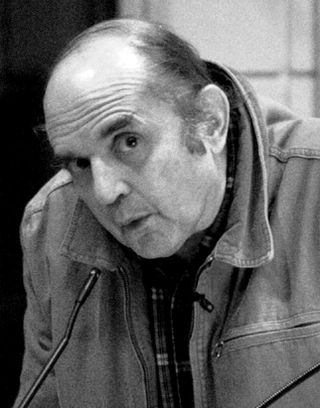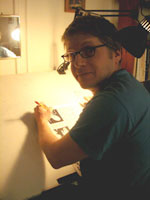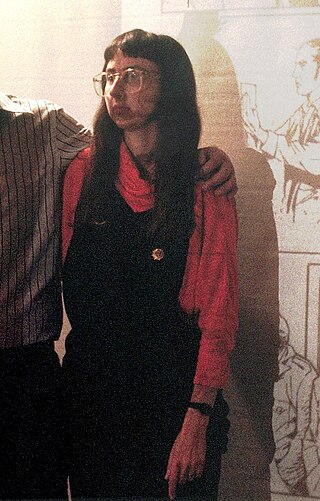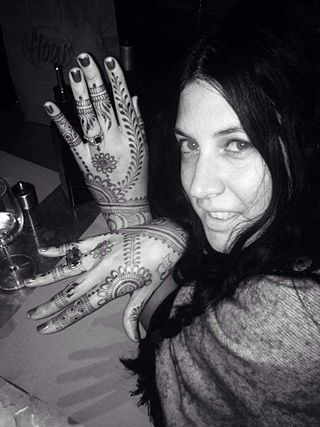Related Research Articles
Webcomics are comics published on the internet, such as on a website or a mobile app. While many webcomics are published exclusively online, others are also published in magazines, newspapers, or comic books.

American Splendor is a series of autobiographical comic books written by Harvey Pekar and drawn by a variety of artists. The first issue was published in 1976 and the last one in September 2008, with publication occurring at irregular intervals. Publishers were, at various times, Harvey Pekar himself, Dark Horse Comics, and DC Comics.

Harvey Lawrence Pekar was an American underground comic book writer, music critic, and media personality, best known for his autobiographical American Splendor comic series. In 2003, the series inspired a well-received film adaptation of the same name.

The infinite canvas is the feeling of available space for a webcomic on the World Wide Web relative to paper. The term was introduced by Scott McCloud in his 2000 book Reinventing Comics, which supposes a web page can grow as large as needed. This infinite canvas gives infinite storytelling features and creators more freedom in how they present their artwork.
Gary G. Dumm is an American comic book artist known particularly for his work illustrating the comics of Harvey Pekar.

Toby Radloff is a former file clerk and actor who became a minor celebrity owing to his appearances in Cleveland writer Harvey Pekar's autobiographical comic book series American Splendor. Radloff has a distinctive manner of speech and quirky mannerisms. He is a self-proclaimed "Genuine Nerd".

Dean Edmund Haspiel is an American comic book artist, writer, and playwright. He is known for creating Billy Dogma, The Red Hook, and for his collaborations with writer Harvey Pekar on his American Splendor series as well as the graphic novel The Quitter, and for his collaborations with Jonathan Ames on The Alcoholic and HBO's Bored to Death. He has been nominated for numerous Eisner Awards, and won a 2010 Emmy Award for TV design work.

Josh Neufeld is an alternative cartoonist known for his comics journalism work on subjects like graphic medicine, equity, and technology; as well as his collaborations with writers like Harvey Pekar and Brooke Gladstone. He is the writer/artist of A.D.: New Orleans After the Deluge, and the illustrator of The Influencing Machine: Brooke Gladstone on the Media.

American Splendor is a 2003 American biographical comedy drama film written and directed by Shari Springer Berman and Robert Pulcini. The film, which chronicles the life of comic book writer Harvey Pekar, is a hybrid production featuring live actors, documentary, and animation. It is based on the 1976–2008 comic book series of the same name written by Pekar and the 1994 graphic novel Our Cancer Year written by Pekar and Joyce Brabner. The film stars Paul Giamatti as Pekar and Hope Davis as Brabner. It also features appearances from Pekar and Brabner themselves, who discuss their lives, the comic books, and how it feels to be depicted onscreen by actors.

Joyce Brabner is an American writer of political comics and the widow of Harvey Pekar.

Michael Terry Gilbert is an American comic book artist and writer who has worked for both mainstream and underground comic book companies.
Brian Bram, raised in Deerfield, Illinois, played a minor role in the underground comix movement with his contributions to American Splendor, the comic book series written and published by Harvey Pekar and, more recently, with his work with author Jonathan Baylis on his autobiographical comic series, So...Buttons.

Reinventing Comics: How Imagination and Technology Are Revolutionizing an Art Form (2000) is a book written by comic book writer and artist Scott McCloud. It is a thematic sequel to his critically acclaimed Understanding Comics, and was followed by Making Comics.

Making Comics: Storytelling Secrets of Comics, Manga, and Graphic Novels is a book by comic book writer and artist Scott McCloud, published by William Morrow Paperbacks in 2006. A study of methods of constructing comics, it is a thematic sequel to McCloud's critically acclaimed books Understanding Comics and Reinventing Comics.

David Collier is a Canadian alternative cartoonist best known for his fact-based "comic strip essays."

Tara Seibel is an American cartoonist, graphic designer and illustrator from Cleveland. Her work has been published in Chicago Newcity, Funny Times, The Austin Chronicle, Cleveland Scene, Heeb Magazine, SMITH Magazine, Mineshaft Magazine, Juxtapoz, Jewish Review of Books, Cleveland Free Times, USA Today, US Catholic, The New York Times, Los Angeles Times and The Paris Review.
Robert Armstrong is a cartoonist, illustrator, painter, and musician. He is known for his underground comix character Mickey Rat, for popularizing the term "couch potato," and for being a member of Robert Crumb's band the Cheap Suit Serenaders.
The business of webcomics involves creators earning a living through their webcomic, often using a variety of revenue channels. Those channels may include selling merchandise such as t-shirts, jackets, sweatpants, hats, pins, stickers, and toys, based on their work. Some also choose to sell print versions or compilations of their webcomics. Many webcomic creators make use of online advertisements on their websites, and possibly even product placement deals with larger companies. Crowdfunding through websites such as Kickstarter and Patreon are also popular choices for sources of potential income.

The Right Number is an infinite canvas webcomic by Scott McCloud. The webcomic makes use of an experimental zooming user interface, where each subsequent panel is nested inside of the panel that comes before it. The Right Number follows a man who discovers that one can figure out someone's character traits based on their phone number, and starts to abuse the patterns he finds to search the perfect girlfriend. The story is focused on obsession and how it is impossible to find the perfect mate. Two of its three parts were published in 2003 through the BitPass micropayment service McCloud was a consultant for at the time. The third part was never released, and when BitPass went under in 2007, McCloud released the two existing parts of The Right Number for free.
Greg Budgett is a Cleveland, Ohio-based comic book artist known particularly for his work illustrating the comics of Harvey Pekar. Most of Budgett's work on Pekar's American Splendor and other comics has been in partnership with Gary Dumm, who has inked most of Budgett's stories.
References
- Joe Zabel at the Comic Book DB (archived from the original )
- Harvey Pekar's Artists